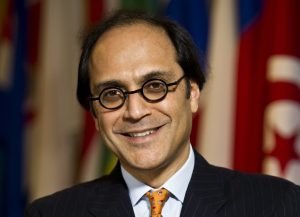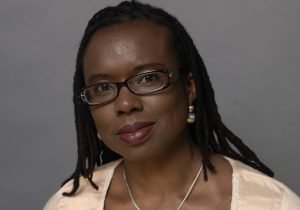With over a billion people, 12 million square miles and seven out of ten of the world’s fastest growing economies, Africa is poised for paradigm-shifting growth. Mobile technology has become the continent’s top economic force, laying the groundwork for economic opportunity and connectivity. The people are ready. Is the world? Read excerpts of the discussion below, or download the full transcript.
Manyika: There now are a billion people living in Africa. In fact, Africa as a region is actually the second fastest growth region in the global economy in the last decade. Faster than Western Europe, faster than Latin America, faster than the United States, so it’s a very fast growing region, and in fact, if you look at the ability to consume, if you look at Internet connections, access to technology, it’s one of the fastest growing regions.
Jidenma: Young people in Africa are very passionate about social. Facebook grew about 50% between February of last year and now, with about 25 million people on Facebook in Africa last year in February, and now it’s about 50 million. There are local social networking platforms, such as Mxit, which has over 20 million users on the Continent. There’s another popular one that has a lot of users in Nigeria called 2go, which is very popular. And these platforms, like in many places in other parts of the world, are helping young people express themselves politically, using platforms like blogs as a means of social expression, but also as a means of gaining employment for themselves.
Ishmael: We are an investment firm, we manage a fund at the moment which is primarily a financial inclusion fund, which means that we invest in initiatives that broaden access to finance, whether that’s for households or for small businesses. We also invest in the traditional bricks and mortar initiatives, and what we’re trying to do is also see how the new opportunities like mobile savings and payments that we’ve invested in can be leveraged in the traditional bricks and mortar, to even have broader impact into the more rural areas.
Rieschel: As I’ve been in China, we’ve been watching the capital flows and the investments that China has been making in Africa, basically building out the physical infrastructure for the entire continent at a rapid rate. There are about 1.3 to 1.4 million Chinese nationals now living in Africa in various forms. There’s been quite a bit written about whether that’s positive for Africa, whether that’s negative for Africa.
Ishmael: If the Chinese are bringing in drivers and construction workers, then it’s displacing people on the ground, and so amongst my peers there’s a debate about whether this is the second colonization of Africa. The question is, is Africa sufficiently ready for the world? Because we need to reengage and reorganize ourselves around this kind of intervention, because it is disruptive on the ground. It looks good from a macro perspective.
Chakravorti: There are probably very different China stories that are happening in different parts of the Continent, and there are some parts of the Continent—for instance, if you talk to some folks in Rwanda, they will have a very different perspective, and they basically take the attitude that the West had its chance. The Chinese are here, and the Chinese don’t bring attitude, which the West did before, and the Chinese have a purely mercantilist approach, you know: “We want your materials, your commodities, and so on, and we’ll build some roads and highways and we don’t want to impose our culture or values or whatever it is on you.” On the other hand, there are other parts of Africa, such as Ghana, where they’ve actually—I think a large part of this is Africans themselves developing that negotiating leverage to negotiate with the Chinese and get on an equal footing. So in Ghana, for instance, they have actually insisted that they use Ghanaians for many of the projects.
Van Rensburg: If you go and you look at what the best known brands in Africa? Coca-Cola. If you go and you stay in hotels, it’s Hiltons or Holiday Inns. You know, I mean, Walmart just bought Massmart. I mean, Visa, that bought my company, and we’re investing heavily—as a US company, Visa Inc. is investing heavily in Africa, but investing on the basis of free markets. We want to make money out of it. We want to make money with you out of it. Many, many Africans are employed by the US companies, and so in a way I think the relationship with the US is kind of come of age.
Ishmael: Africa is changing its story. It’s no longer about bringing aid to Africa, it’s no longer just about trade, but it’s engaging as innovators, and having innovation exported out of the Continent.
Van Rensburg: Amazon’s got a lab in Cape Town, right? The on-demand stuff was built in Cape Town. So, the cloud that—Amazon was one of the first—the cloud that we all talk about was invented in Africa. In effect, built in Africa, in the labs in Africa. There’s many examples in mining, you know, that is really, really high tech, in telecommunications that’s actually being developed in Africa, in Kenya, in countries like Ethiopia. High education, really, really highly educated engineers coming out of countries like that.
Rieschel: There’s a massive amount of railroad infrastructure that’s being put in place. So all of the nice things that would happen in retail, all of the nice things that would happen in agriculture mean nothing if you don’t have really efficient distribution. So some ridiculous amount of vegetables and fresh cut flowers are flown every day from Kenya to Europe, and you’re talking now about a business that’s probably on the order of tens of millions of dollars, if not hundreds of millions of dollars a year. And that only works because the port infrastructures, and the friction in terms of the commerce in certain areas has started to come down. And that would actually be the area where you’d like to see technology applied more in Africa, which is reducing friction.
Jidenma: So what things like social media have done is that it’s given people a voice. Because of technology, even if they can’t afford to go to a certain kind of school, they can take a course at udacity.com and challenge themselves and push themselves forward. And aggregate and incubation labs are growing all over the continent.
Rieschel: Where Africa is likely to be a huge competitor, as an entity, it’s with India. And I actually think if I look out 20 years, I would be far more positive about Africa than I would be about India. Probably knowing more about India today than I know about Africa, but looking at it from the standpoint, again, of the infrastructure, the pockets of entrepreneurship, and the fact that now there really is a much more open attitude.










